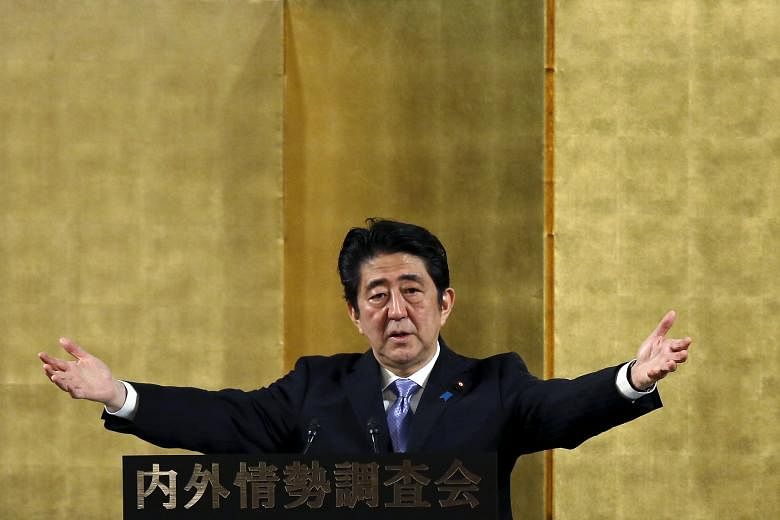TOKYO • Japanese Prime Minister Shinzo Abe's tax concession to his junior coalition partner raises the odds that he will call a rare double election next year.
Mr Abe's Liberal Democratic Party (LDP) agreed with Komeito on Saturday to keep the sales tax rate on food and drink - excluding alcohol and dining out - at 8 per cent when the levy is raised to 10 per cent in April 2017.
In yielding to Komeito on its billboard policy, Mr Abe may be able to persuade his ally to agree to snap Lower House elections on the same day as upper chamber polls scheduled around the end of next July.
Needing Komeito's backing in the Upper House elections, Mr Abe brushed aside the concerns of the Finance Ministry and fiscal hawks in his own party who say that the lower rates would have to be offset by spending cuts to reel in the world's biggest debt burden.
Victory in double elections would mean Mr Abe need not face voters again until 2019, opening the door for him to push ahead with his long-cherished goal of revising the post-war pacifist Constitution.
The reduced tax rates on food and drink are "one of many initiatives being rolled out to woo voters. If it works and public support looks good, then, yes, he will hold double elections," said Professor Jeff Kingston, director of Asian Studies at Temple University in Japan.
"If he can pull off a double landslide, it will fast forward his plans to revise the Constitution, his main goal since entering politics."
Earlier this year, Mr Abe faced massive protests outside Parliament and his support plummeted as he pushed through Bills to allow Japan to send troops to fight in overseas conflicts for the first time since World War II.
However, any attempt to revise the top law - unchanged since its 1947 enactment under American occupation - would likely draw even bigger demonstrations and further hurt an approval rating that is now recovering after a slump.
Only twice before - 1980 and 1986 - has Japan held such double elections. Mr Abe has denied media reports that he is considering such a move, and Komeito chief Natsuo Yamaguchi said this month that holding polls on the same day was undesirable, according to Kyodo News.
Osaka Mayor Toru Hashimoto tweeted last Friday that Mr Abe's agreement on the reduced tax rates was part of the Prime Minister's push towards constitutional change, and a two-thirds majority in both houses next summer would put revision on the table.
The double elections would be an "unnecessary gamble" if Mr Abe was not going for a formal revision of the top law, said Professor Koichi Nakano, professor of politics at Sophia University in Tokyo.
Still, Mr Tobias Harris, a political risk analyst with Teneo Intelligence, sees the agreement as a victory for Komeito.
"It was essentially a quid pro quo for the party's acquiescence to the Abe government's controversial security Bills, which sparked tensions between Komeito's leaders and its pacifistic rank-and-file members," he said in an e-mail.
Mr Abe's LDP originally proposed an agreement only on fresh food, but the agreement with Komeito expands the lower levies to processed food.
The Prime Minister told reporters in Tokyo yesterday that the deal was the "best possible result".
He is now unlikely to further delay the 2 percentage point hike in the overall tax, said SMBC Nikko Securities economist Koya Miyamae.
BLOOMBERG

